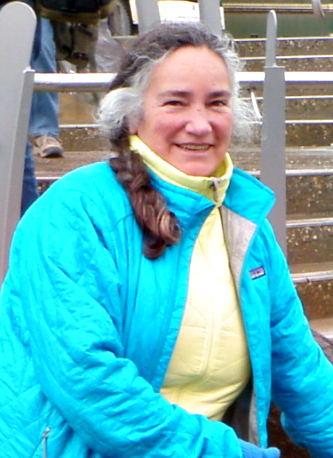Campus News
Environmental studies lecturer wins anthropology association public policy award
Barbara Rose Johnston, a UC Santa Cruz lecturer in environmental studies, has been named a winner of the 2015 Anthropology in Public Policy Award from the American Anthropological Association.

OLYMPUS DIGITAL CAMERA
Barbara Rose Johnston, a UC Santa Cruz lecturer in environmental studies, has been named a winner of the 2015 Anthropology in Public Policy Award from the American Anthropological Association.
Johnston, a senior fellow at the Center for Political Ecology, a Santa Cruz-based nonprofit, most recently taught an environmental studies class, Amazon Cultures and Conservation, in spring 2015.
She is scheduled to receive the award November 20 when the association holds its annual meeting in Denver where she will deliver a formal lecture on her science and human rights work. She is sharing the award with Edward “Ted” Harman of the University of Nebraska, Lincoln.
The award honors anthropological insights and analyses from the implementation of effective and beneficial policies within the last five years. “We were impressed with both of these nominees and felt their work showcased the spectrum of policy contributions that we seek to honor with this award,” said Susan Bibler Coutin, chair of the Anthropology in Public Policy Award Committee, in a statement. “Their collective research and insights have had lasting and significant impacts on global policy.”
Johnston’s research addresses linkages between environment, health, and human rights with the objective of documenting human environmental rights abuse, and strengthening accountability in international development, water resource management, and nuclear disaster.
Her study documenting the consequences of the Chixoy Dam in Guatemala helped inform negotiations over reparations for local residents displaced by the dam, built during Guatemala’s repressive military dictatorship. The project, financed by the World Bank and the Inter-American Development Bank, was built on the Chixoy River in the early 1980s and forcibly displaced more than 3,500 Maya Achi community members. More than 6,000 families living in the area also suffered loss of land and livelihoods.
The study encouraged U.S. restrictions on World Bank and other international financial institutions financing in Guatemala and led to the adoption of a formal reparation mechanism that addresses injuries and impoverishment resulting from internationally financed hydroelectric dam development.
Johnston’s other recent work includes educating global leaders about the role of water in sustaining biocultural diversity and the environmental and human rights implications of nuclear militarism in the Marshall Islands, research that has helped shape and encourage the implementation of internationally recognized United Nations policies.